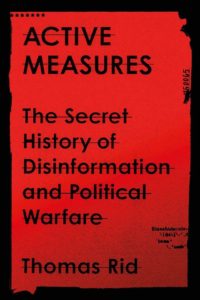SIO Live: COVID Disinformation and Platform Responses with @EvelynDouek and @NoUpside https://t.co/8Ea6Wm8tEx
— Alex Stamos (@alexstamos) May 14, 2020
In his annual lecture in December, General Sir Nick Carter, Britain’s chief of defence staff, warned that “the idea of political warfare has returned”. Authoritarian rivals were unpicking the seams of society and politics in the West using disinformation, espionage, assassinations, cyber-attacks and proxies. General Carter had struck on the same problem identified by George Kennan, a renowned American diplomat, at the outset of the cold war. Americans, Kennan said, viewed war “as a sort of sporting contest outside of all political context”. Russians grasped “the perpetual rhythm of struggle, in and out of war”, The Economist reports, reviewing four new books on the murky struggle between Russia and the West.
 Thomas Rid’s “Active Measures” pulls important insights out of this tangled history, it adds:
Thomas Rid’s “Active Measures” pulls important insights out of this tangled history, it adds:
- One is that disinformation is not the same as fabrication. In fact, it can be most effective when “larger truths” are “flanked by little lies”. .
- A second lesson is that disinformation is not only corrosive to open societies, which depend on collective trust in facts, but also takes a subtler toll on the perpetrator. “When vast, secretive bureaucracies engage in systemic deception, at large scale and over a long time,” warns Mr Rid, “they will…undermine the legitimacy of public administration at home”.
Soviet propagandists often deceived themselves, he notes. “It is impossible to excel at disinformation and democracy at the same time.” RTWT







